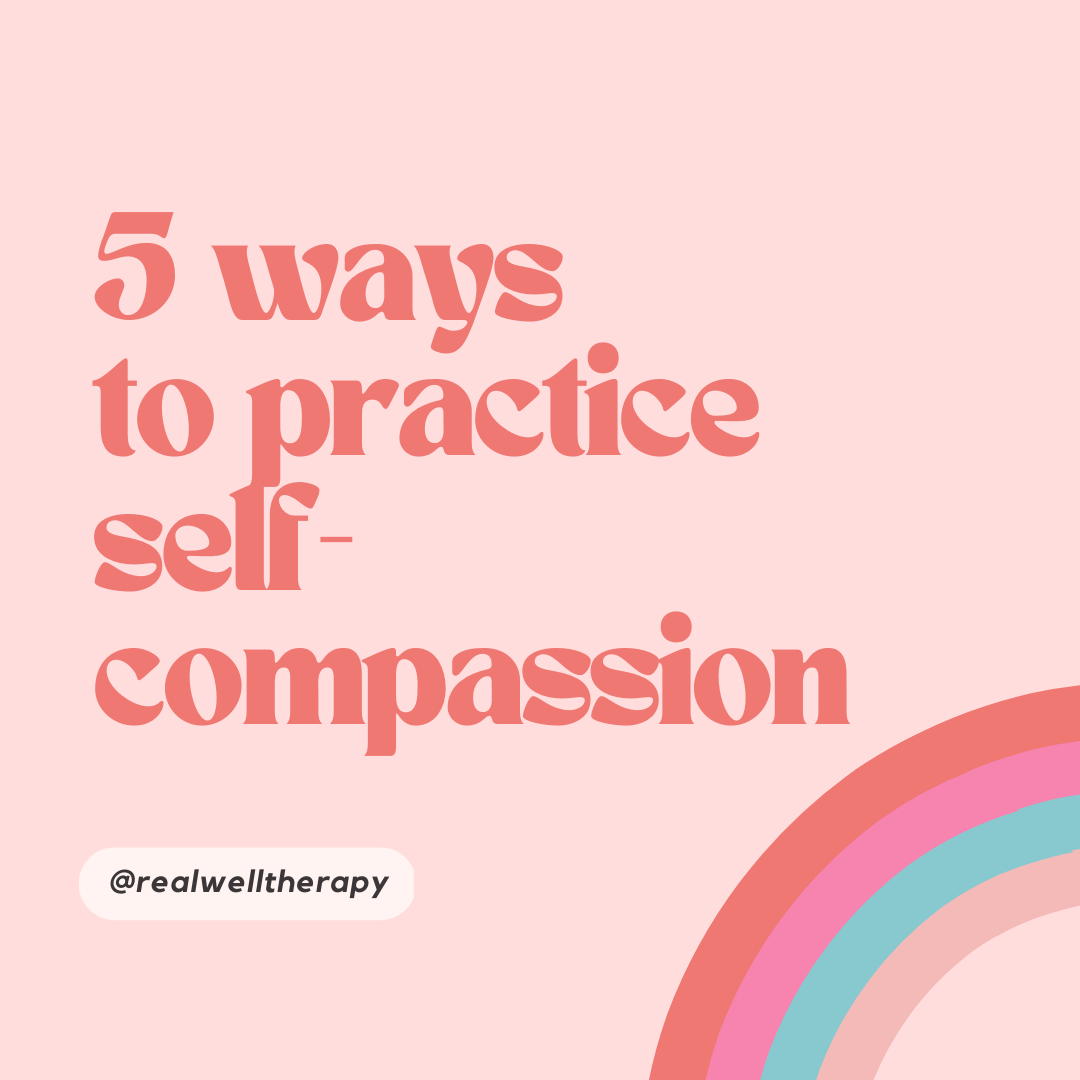Why Self-Compassion is the Best Resolution For Yourself this Year
Happy New Year! Anyone else feel like it has taken them a while to get into the swing of things after the holidays? It is now half-way into January and I am still working through personal goals, shifts, and changes I want to bring into my space for 2023. But that’s okay, there is still plenty of January left - did you see how I was able to practice self-compassion there?
So let’s get down to business. Self-compassion is probably the #1 thing that I consistently bring into therapy sessions with clients. I love it. It’s incredibly powerful, simple, and easy (with some practice).
So what is it? Self-compassion is the practice of being kind and non-judgmental to yourself, especially in the midst of pain or failure. In short - don’t treat yourself like an a-hole. If you’re able to be kinder to yourself when things are difficult (while also holding yourself accountable), then these skills can translate into a greater ability to cope with difficult feelings and be able to hold greater compassion for others as well.
It's all too easy to be our own worst critic – HELLO PERFECTIONISM - which makes self-compassion a valuable tool for most of us. And research is on board! A number of studies into self-compassion have found that it can be extremely beneficial for many aspects of health and well-being. Our own Austin original and self-compassion guru herself, Kristin Neff, has found that self-compassionate people tend to be less stressed and anxious than those who are hard on themselves.
What is Self-compassion?
At its’ core, self-compassion is the practice of being kind and understanding to yourself, especially during difficult times when you might be feeling down, moments of failure or imperfection.
Most of us are too dang hard on ourselves as I’m sure you’ve experienced this at some point too. Like when you beat yourself over anything and everything you do. When you criticize and form judgments over everything about who you are - from how you look, your accomplishments at work and school, even your thoughts and feelings, including those that are completely normal reactions such as feeling guilty for getting snippy with a loved one when you’re stress or overwhelmed.
If this sounds like you, then incorporating more self-compassion could be a great resolution for you in 2023! By learning how to be kinder toward yourself, you can improve your overall well being as well as help with any anxiety present as a result of overthinking and perfectionism tendencies you may be experiencing.
Self-Kindness
Self-kindness is about showing kindness and understanding toward ourselves when we fail at something, or when we are hurt (Neff, 2003a). Rather than being critical or judging ourselves harshly when we already feel pain, we can recognize the negative influence of self-judgment and treat ourselves with warmth and patience instead (Gilbert & Irons, 2005).
In short, showing self-kindness means treating our worth as unconditional even when we fall short of our own expectations, whether it’s through our behaviors or even just our thoughts (Barnard & Curry, 2011).
Self-compassion as a coping tool
It's all too easy to be a total jerk to ourselves. The more we judge ourselves and experiences, the more we feel like crud. Having self-compassion brings in more forgiveness, acceptance, and compassion towards yourself when you experience difficult thoughts and feelings. This creates more space to cope in a way that better serves you. When you are self-compassionate, you are less likely to catastrophize, experience less overwhelming anxiety and to try new things more than before.
Self-compassionate people are less stressed and anxious
Research by self-compassion superhero and psychologist Kristin Neff, has found that self-compassionate people tend to be less stressed and anxious than those who are hard on themselves. They were more likely to be resilient after experiencing failure, as well as happier and less lonely. Yes!
Self-compassion can also help you manage stress. When you're feeling overwhelmed or frazzled, it's easy for your mind to spiral out of control with thoughts like "this is going to ruin my life!" or "I'm so stupid and “I don't know what I'm doing." Acknowledging these thoughts without getting wrapped up in them as truth is essential to getting back to a balanced and calm state. Having positive affirmations at your fingertips can make this easier for you in the moment -
Acknowledge and take responsibility for your mistakes
Yes, self-compassion is all about being kind to yourself BUT it does not include ignoring your mistakes or letting yourself off the hook for them. My client’s tell me all the time they don’t want to make excuses for their behavior. I don’t want them to do that either! Self-compassion also allows you to acknowledge when you've messed up. The difference is in not then beating yourself up over it, especially if you’ve set an unrealistic standard of perfection for yourself.
You don't stop taking responsibility when you make a mistake; instead, try accepting that failure and mistakes are a part of life while making sure that you're you’re working towards personal growth and success instead of just settling on “it is what it is” (or worse: giving up altogether).
Self-compassion does not excuse self-accountability.
Self-compassion is no an excuse to go do whatever you want without taking accountability for your actions. This is a crucial part to remember. Pity, sympathy, and complacency is different than self compassion. These focus on the unhelpful feelings about yourself and situations without helping you find self-efficacy for improving the situation or allowing space for feelings.
For example, if someone cuts me off in traffic and I feel angry about it for hours afterward, leading me to then be snippy with those around me self-compassion would look like allowing the feeling of anger be there without judgment while taking accountability for processing the emotion and responding with greater patience rather that irritation.
This Accountability is a huge piece that people tend to miss or go the other direction and dismiss self-compassion all together because they call bullshit. Let’s acknowledge when we may have fucked up but then leave it at that. We don’t have to be mean to ourselves as well in the process.
While you're learning to be kinder to yourself, it's important not to confuse self-compassion with three other things:
Self-indulgence: not allowing yourself every desire without question or consideration of the impact on others.
Self-flagellation: If you make a mistake, don't beat yourself up about it. Gently direct your attention toward behaviors that will help you avoid making similar mistakes in the future.
Self-pity: Don't wallow in shame. Notice it. Feel it as long as you need to. Let it go focus on what is working in your life right now.
Self-compassion helps minimize blame
Self-compassion is a key part of being human. It is a skill that allows you to be more aware of your feelings and thoughts without harsh judgment, which helping you make better decisions in your life and take responsibility rather than placing blame on others around us or the situations in which we have minimal control. In this sense, it also incorporates radical acceptance of what we cannot change and what we can.
Self-compassion helps us take responsibility for our own mistakes rather than blaming others or making excuses for them.
Bottom line
The key to self-compassion is to be kind and understanding with yourself, free of harsh judgments. This in turn helps you to feel less stressed and anxious. In fact, there's even evidence that being compassionate towards yourself could help you live longer! It's important not to forget about your own mistakes and errors when practicing self-compassion and taking accountability for yourself rather than ignoring them.
Ready to jump right in?
If want get started right away, check out the guided meditations by Kristin Neff or click the following image -
If you feel like you’re getting stuck along the way or want more guided support, it may be time to seek a consultation with a therapist. Contact Real Well Therapy here or call 512-686-7009.
Therapy can help
If you feel like you’re getting stuck along the way or want more guided support, it may be time to seek a consultation with a therapist. Contact Real Well Therapy here or call 512-686-7009.
Want to learn more about how anxiety therapy can help you? Click here!
Don’t miss out! Sign up below for blog updates.
(Don’t worry, I won’t spam you or share your information).
Disclaimer: the information provided in this blog post is for educational purposes only and should not be construed as medical advice or a substitute for professional consultation. If you are experiencing emotional distress, please reach out to a qualified mental health professional.



